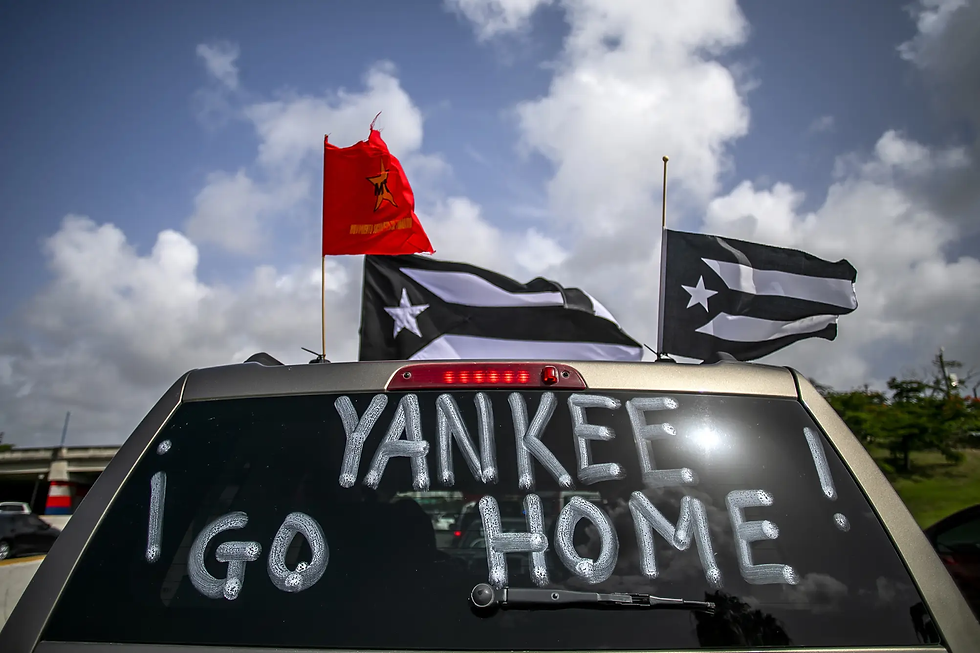Puerto and Their Beaches: A Modern-Day Colonial Issue
- voicesofgenz
- Apr 16, 2022
- 3 min read
By: Melissa del Carmen Gomez

Image retrieved from TIME
Earlier this month, thousands of Puerto Ricans protested against the privatization of their country’s beaches. It is a law that all the beaches in Puerto Rico should be accessible and publicly open. However, there has been a decade-long struggle as hotels and apartment condos have been built on the coasts of the beaches which have then become privatized.
These foreigners and property owners do not seem knowledgeable about the laws. For instance, on January 26, 2022, a video was posted on social media in which a couple who bought a property in Ocean Park tried to close off a section of the beach for themselves. When confronted by Puerto Ricans, they chose to insult them. “Buy a million-dollar house, then you can give your opinion here,” the woman in the video said.
So, in response, a man named Wilmar Vázquez organized a protest with other Puerto Ricans: a “Beach Olympics” where beach block parties were hosted. The block party was hosted in front of the couple’s house to illustrate that the beaches are not private property and are in fact open to the public, a law that has always existed in Puerto Rico and that will always remain.
Statistically, between December 2020 and December 2021, the cost to live in Puerto Rico rose to 7%, a record-breaking percent increase since 1981. Due to Act 22, a law stating that non-Puerto Ricans can move to the island and not pay taxes to the IRS, many from the mainland have come to Puerto Rico because of the low tax rates. Influencers, such as Logan Paul, have moved to the island. This act does increase revenue but pushes people out of their neighborhoods as housing prices increase. Puerto Ricans are being forced out of their own lands.
María Torres-López, a 38-year-old who moved out of Puerto Rico to Florida for better work and financial opportunities, discusses the issue: “If anybody needs to be moving and buying in Puerto Rico, it needs to be the Puerto Rican people who had no other choice but to leave. I didn’t want to leave. I wanted more and my country wasn’t able to give it to me.”

Image retrieved from Yahoo!News
Due to the overwhelming increase in population and gentrification of the public beaches, protests have been emerging regularly. Puerto Ricans held signs stating, “This is what colonizers look like!” and “Gringo go home!” with photos of Logan Paul or other non-Puerto Ricans who had brought large mansions near the beaches.
The impact of multiple construction projects has led to environmental-related issues as well. Late last year, Puerto Ricans protested in Rincón, a town on the island’s west coast. The project itself destroyed a nesting site of a hawkbill turtle. A petition has been made demanding that the Puerto Rican government “abides by the law that protects this land for agricultural and ecological purposes and prevents development that would be harmful to the environment.” The link to this petition can be found here.
This issue is also an example of modern-day colonization. An abolish Act 60 activist reported to TIME magazine saying, “Right now Puerto Rico looks like the apocalypse hit it because of the government neglect, it's a matter of who takes over from here: Puerto Ricans or tax-incentivized foreign entities? There’s no excuse for them to create ‘opportunities’ by becoming owners of land our ancestors have inhabited for over 400 centuries.”
Inequality persists as native Puerto Ricans are being forced out of their neighborhoods and displaced into cheaper communities. On the other hand, wealthy, white Americans can simply buy the land for their own pleasure and paradise, not connecting with the Caribbean community. Puerto Rico, however, is not for sale, and its beaches are not for sale either. Puerto Rico is not “an attractive piece of real estate in the American empire.”
Puerto Ricans will continue to advocate and fight for their land. The government has failed them, but they are taking matters into their own hands. “The government’s priority should be to adapt and protect what we have and not build new infrastructure in at-risk areas,” Maritza Barreto, a study lead research implores. To stay informed on this topic, Tik Tok influencer and independent reporter Bianca Graulau creates content discussing this topic and the growing concern of the Puerto Rican population facing displacement within their own land. Access to her videos can be found here.
Written by writer Melissa del Carmen Gomez







Comments